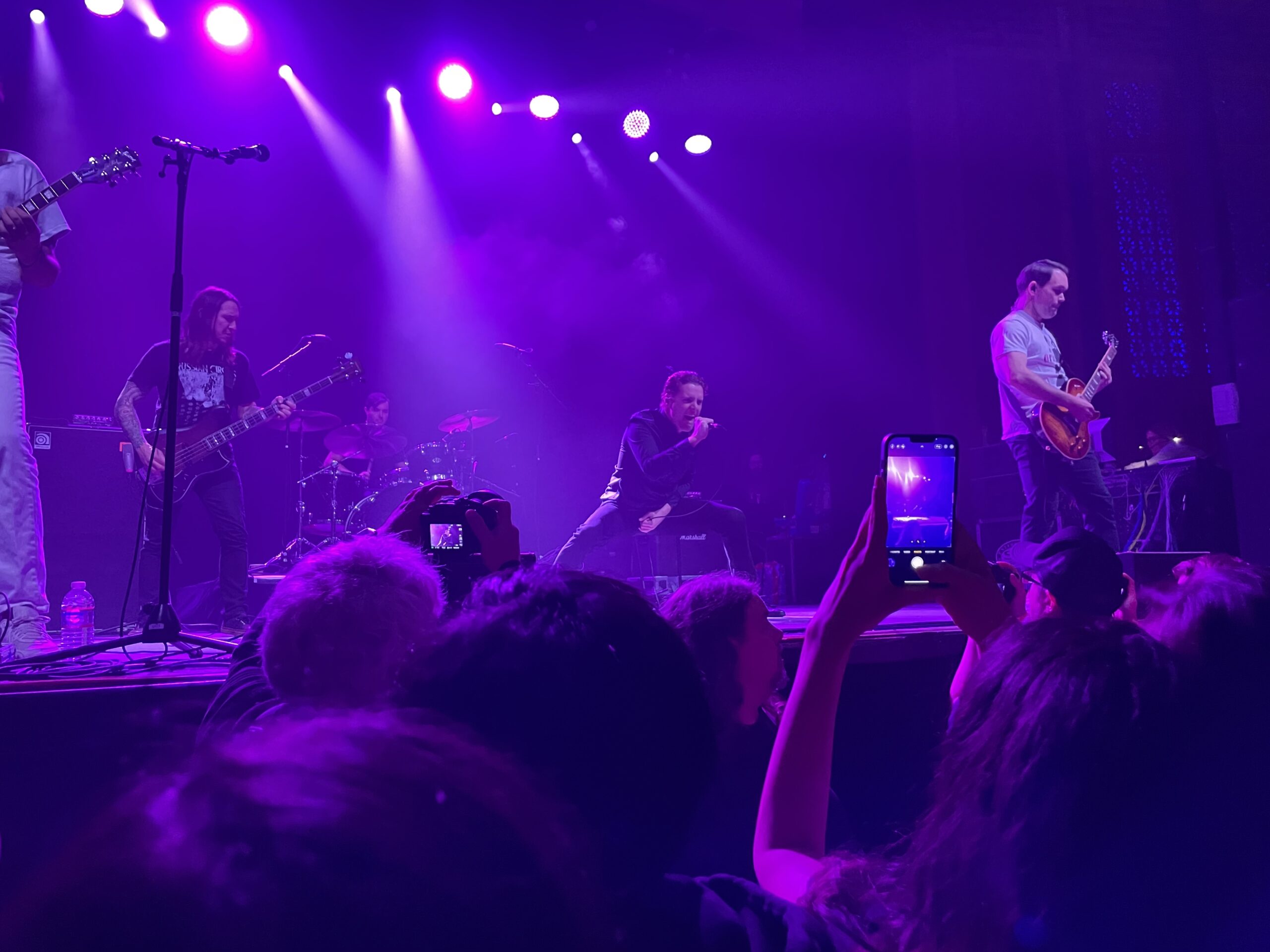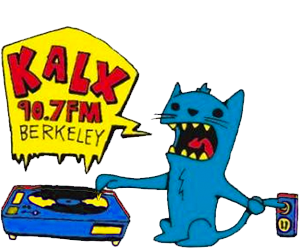Review and photos by Mia Call.
After less than 24 hours of recovery, UC Theatre patrons returned for day two of Homesick fest, this time ready for a much more hardcore line-up. The festival, held this year on Friday and Saturday, January 20-21st, was started by punk rock group Ceremony in 2018, and although the fest has featured softer acts over the years (The Umbrellas, harpist Mary Latimore, and this year, Snail Mail), day two was definitely the heavier of the weekend. One group of bleached and pierced teens admitted to me, in between sets, that they had snuck out on Friday before Snail Mail even took the stage. And then, as if to emphasize how little they knew or cared about the indie rock sensation, one eyed me suspiciously and asked, “Are you in Snail Mail or something?”

The Saturday crowd was skewed heavily male, especially down in the pit, where moshing was intense and almost constant. In the seated sections, veteran punk and metal heads enjoyed from afar. An anecdotal survey found that most patrons came in anticipation of the headliner, Deafheaven, although some of the more hardcore crowd also touted their love for opener Spy or even complained that they came to see Ceremony (who wasn’t able to play the festival this year). Although I couldn’t make the first couple sets (zzzahara, Margaritas Podridas,and Spy), I snuck in just in time to catch the last couple songs by Screaming Females, a New Jersey based 3 piece rock outfit with a simple yet powerful sound.
The band’s name is a misnomer, as Screaming Females only features one screaming female, Marrissa Paternoster, who stole the show with her Corin Tucker-like wailing and brash but melodic guitar solos.Paternoster wore an unassuming blue pioneer-style dress, but her head-banging and screaming was hardcore as anything else, her bangs obscuring her vision and her guitar utterly blazing as she howled threateningly, “I’ll make you sorry.” The crowd seemed tired, perhaps from an intense pit from the previous act, hard-core punk rockers Spy, but on the last song, the gaping hole where a mosh used to be was finally filled with concert goers pushing and shoving, and skanking. If Paternoster approved, there was no sign on her face, as she was dead focussed on her music– a raw translation of anger and joy and resistance into grungy solos and emotive wailing.
Tempers, an electronic duo from New York, took the stage next with a much more understated energy. Singer Jasmine Golestaneh brought drama and lots of reverb and long-delayed vocals. While the entrancing if sometimes repetitive instrumentals (provided by an uninterested-looking Eddie Cooper on guitar and synth) felt like grungier versions of 80s synth songs, the songs still felt too slow and clean to capture the attention of the audience. Despite a couple random dancers grooving to the music, the audience mostly just swayed side to side, unsure what to do with music you couldn’t mosh to. Highlights of the performance included Beachhouse-like riffs on guitar from Cooper, and Golestaneh’s otherworldly harmonizing with her own reverbed vocals, and her ability to perform, dancing to her own music even if no one else was.
The pen-ultimate act, Boston-based emo/punk group Fiddlehead, got the audience screaming and shoving again after the hypnotic sway of Tempers. The band, a supergroup composed of members from various other post-hardcore bands such as Have Heart and Basement, put their pedal to the metal the second they got on stage and didn’t let up for one second. Front-man Pat Flynn leapt around stage, gripping the mic stand for his life as he screamed about lost friendships and the disenchantment of middle age. Although the band was solidly in their 40s, they had the energy of young teens who just discovered punk for the first time, and their joy radiated from the stage. The crowd matched their energy, pogoing and shoving – the music just made you want to move. After a wild 15 minutes, Flynn finally managed to catch his breath and introduce the band, and spoke sincerely about the importance of holding onto old friendships. However cheesy his message, it was made up by the utter sincerity, and metalheads with gauge piercings and shirts that said “Mankiller” genuinely cheered when Flynn touted the strength it takes to be kind.
Later in the set, he condemned the macho punk of his youth, asking the crowd to push back against their conceptions of masculinity and become gentle. As the band launched into slower, more 90’s sounding grunge, reveling in the glory of a raucous and resonant guitar sound, the vulnerability of Flynn’s voice shone through. With almost all of the crowd jumping to the music, lost in the sound, Flynn howled “nothing can change the pain, and I don’t want it to,” his performance almost feeling like a release for himself. When the band stumbled off the stage, sweaty and exhausted, the crowd in the pit still seemed captivated, under Flynn’s spell of raw honesty and passion. Fiddlehead’s vision of the future of punk, full of kindness and honesty, felt like an enchantment that came over the UC theater.
After the spell wore off, the excitement and apprehension for the header, SF-based Deafhaven, was palpable. I overheard one fan mutter the age-old hardcore plea: “I hope they don’t play too much of their new stuff.” This seemed to be a common consensus, as one metal head explained to me that the band’s most recent record had been deemed too ‘melodic’ and ‘pop’ by most serious metal lovers, with their most recent album, Infinite Granite, featuring clean vocals. But many fans also expressed their love for the band’s experimental streak. It pioneered in the genre of Blackgaze– a mixture of Black metal and shoegaze, and the cofounders —George Clark and Kerry McCoy, draw inspiration from diverse sources, creating a varied yet accessible sound.
When the band stepped on stage, dressed in casual t-shirts and button downs, the audience very nearly held their breath. Then, with no introduction, the band launched into “Black Brick,” a pretty classically sounding metal song featuring absolutely demonic vocals from Clarke, who launched into action as if by possession, death-staring at the audience and gyrating wildly– in short, I was terrified. But the rest of the audience began moshing with careless abandon, pushing and shoving, but mostly reaching their hands out towards the band, as if spiritually compelled. Although Apple music claims this song has words, they were completely unintelligible to me. Yet fans screamed them right back in Clarke’s face, in a deep and guttural voice that sounded inhuman. The wall of sound, emanating from drums, guitar, and bass, made me very glad I had brought earplugs. You could feel the music in your throat.
For Clarke, the performance was clearly more than just the music. As he wailed, spit dribbled down his chin and he writhed on the floor, all while sounding like a dying animal. He made it a point to serenade each side of the crowd, intensely staring as if he wanted to kill us, and gesturing with his hands for us to move closer. Multiple times throughout the set, he sat down at the edge of the stage, and jumped between the barriers to touch the hands reaching out to him. As the band transitioned to newer material, featuring melodic, harmonious vocals for a change, Clarke maintained the same energy, although the performance lost a little steam.Clarke also had a message — telling the audience to “get close” as if that was an emotional state in itself.
Deafhaven was at its best when it combined the chaos and the harmony. For the last song of the night, Clarke once again urged us to “come close,” and as he let McCoy take lead, he once again climbed to the edge of the rail, to touch the hands of his fans. Later, when I asked one death metal fan why she enjoyed the music so much, she explained she liked it because she could feel the music throughout her whole body– the music creates a palpable, physical connection between performer and audience, uniting every object that feels the vibrations. As Deafhaven closed the night with “Dream House,” their 2013 hit that embodies their mixture of shoegaze, pop, and metal, a song heavenly on its own, I realized that it was a song meant to be listened to like this: in a venue surrounded by hundreds of other screaming, sweaty people.
Clarke’s insistence to physically connect with the crowd came to a head in this song, first when he threw his mic into the audience, for fans to sing along. But as the raucous, beautiful chaos came to its climax, Clarke jumped into the crowd, surfing until he was guided back to the stage. Fans and the band screamed along, with the audience almost louder than Clarke’s mic, and for the first time I was able to understand what they were singing. In earsplitting, yet joyful voices, the audience and band became one, singing a song of resistance. The words– howled but somehow still hopeful– echoed off the walls, as wave after wave of sound crashed down on the pit. Fans held hands to their hearts, or reached out towards Clarke, frenzied on stage, as the whole theater sang “I want to dream.” For a supposedly demonic death-metal band, the musical communication and connection of Deafheaven at Homesick fest was nothing short of spiritual.


